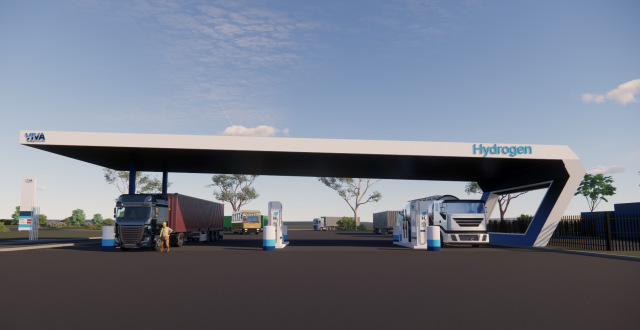Geelong could be serviced by hydrogen-powered buses and garbage trucks within two years under a new project announced by Viva Energy.
Viva Energy on Tuesday announced it would develop a New Energies Service Station at its Geelong refinery to kick start a shift to hydrogen power for heavy vehicles.
The service station will be Australia’s first publicly accessible commercial hydrogen refuelling station and is expected to begin operations in late 2023.
It will also be a key component of Viva Energy’s Geelong Energy Hub.
The $43.3 million project will incorporate a two-megawatt electrolyser for the generation of green hydrogen using recycled water from Barwon Water’s Northern Water Plant.
The dispensers will be able to fill up 10 heavy vehicles in 90 minutes.
Viva Energy managing director Scott Wyatt said it was designed to facilitate the commercial deployment of hydrogen fuel cell electric vehicles in industries that couldn’t be easily decarbonised, including road freight, public transport, municipal waste management, water treatment and general fleet.
“This project puts hydrogen-powered vehicles on the road to prove their value in day-to-day commercial operations while reducing the carbon footprint of the heavy vehicle transport we rely on every day,” he said.
“At Viva Energy we believe that hydrogen has a key role to play in decarbonising heavy transport by replacing diesel with hydrogen-powered fuel cell electric vehicles.
“Hydrogen carries energy which is made from green electricity and water and is converted back into electricity as it is consumed by the vehicle. As a result, it is lightweight, has enough energy for long distance travel and can be refueled much more quickly than traditional battery electric vehicles.
“Hydrogen, in our view, is therefore ideal for heavy vehicle commercial applications where payload, distance and availability are critical.
“The need to replace and recycle batteries is eliminated and the drivers refueling experience is very similar to filling the truck with diesel.”
The project has received support from the federal government through a $22.8 million grant from the Australian Renewable Energy Agency’s (ARENA) Advancing Renewable Programs.
The state government have also contributed $1 million to the project.
Viva Energy will work with several organisations locally to initially introduce a fleet of 15 hydrogen-powered vehicles which would be refuelled at the station.
Organisations that will adopt the hydrogen-powered vehicles from the start include Toll Group, which will use two prime movers to deliver liquid fuels from the refinery to service stations, and bus operator CDC, which will use two buses on its routes around Geelong.
Cleanaway will use two hydrogen-powered garbage trucks around Geelong while Barwon Water will initially trial one prime mover for collecting organic waste.
“[It] will not be long before hydrogen powered trucks, buses and municipal waste vehicles will be a feature on Geelong’s roads, regularly returning to our refueling station to fill with hydrogen,” Mr Wyatt said.
“As we build experience, we expect that this initial investment will lead to the development of a network of hydrogen refueling stations from Geelong to Sydney and onto Brisbane, so we can provide a meaningful zero emission solution for transport operators along the busiest routes of the country.
“This is an incredibly exciting project for us.”
CDC Australia chief executive Nicholas Yap said the company had experience using hydrogen buses in London and was excited to partner with Viva Energy for its first hydrogen-powered fuel cell electric buses in Australia.
“At CDC we have consistently demonstrated our commitment to reducing emissions in transport with Australia’s first hybrid bus technology offering zone-based zero emissions,” Mr Yap said.
“We see strong potential for hydrogen and importantly an eco-system of Australian based providers driving collectively toward a cleaner future for Australians.
“It is also great news for our customers in Geelong who will experience this exciting technology through their daily commute.”
ARENA chief executive Darren Miller said the service station project had national ramifications and was essentially a guide for how to manage a switch to hydrogen-powered vehicles.
“We’re standing at a very important place both in time and in space. This is the intersection of two very important industries for the future – the transport industry and the hydrogen industry.
“Hydrogen stands to be a major contributor to our goals to decarbonise the world’s energy supply. Transport in Australia accounts for 18 per cent of emissions and heavy vehicles are a major share of that, consuming 24-25 per cent of all fuel in Australia for road transport.
“Nothing is more important than the visibility that [the project] will provide – the demonstration that this is possible and the knowledge sharing that we’ll gain [about] what it takes to build a project like this.
“And ultimately to have this rollout in a much more significant scale over the next few years and decades ahead.”
Corio MP Richard Marles said the project would have major benefits for Geelong.
“This is an ambitious development for Geelong, and one I’m very excited to see progress,” he said.
“This project is part of the evolution of Viva Energy, which has been an iconic part of Geelong since the early 50s.
“Developments like this give a long-term future to this site, which is really important for jobs in Geelong.
“I welcome the plans for this place to become an energy centre which leads Geelong into the future and Australia towards net zero emissions.”









